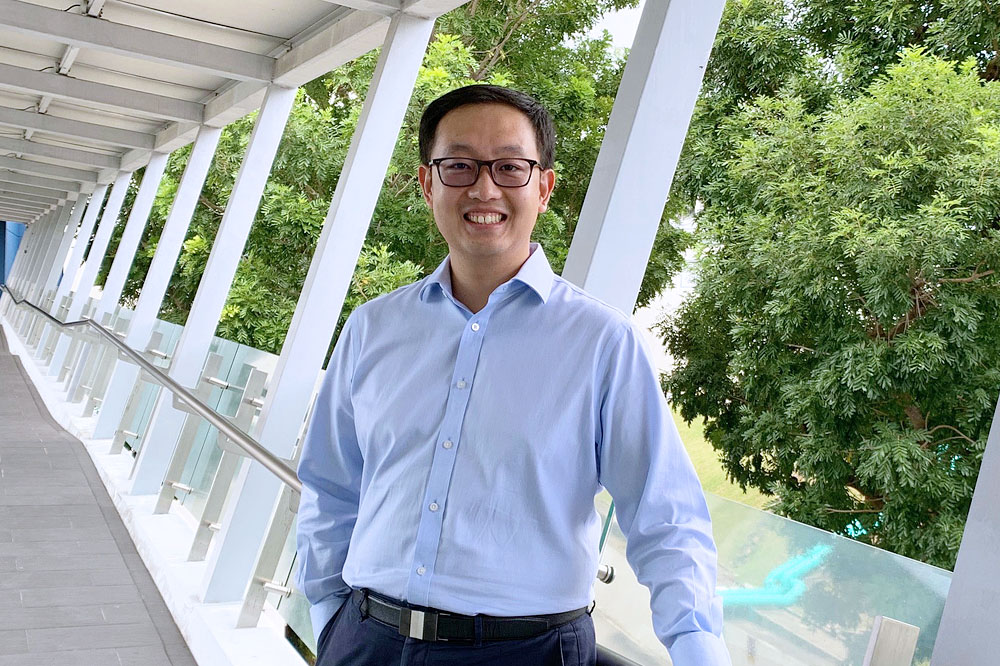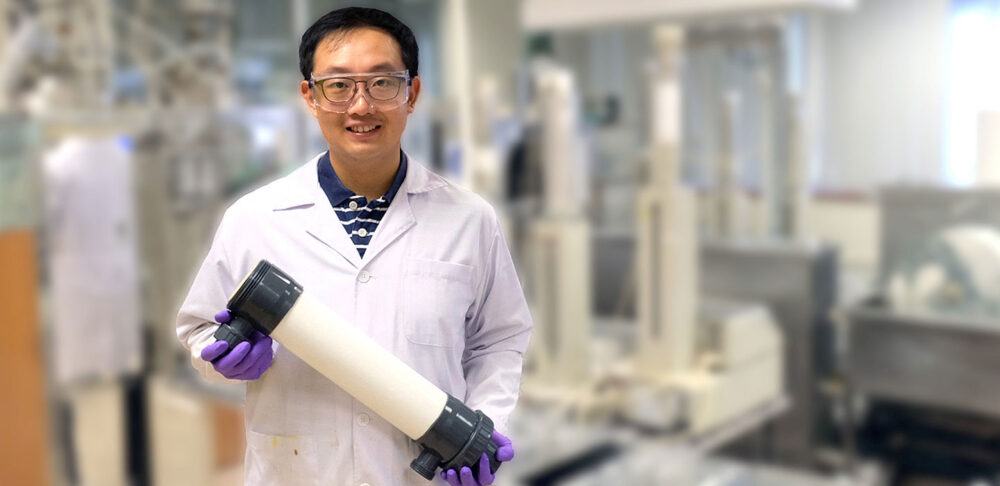He uses membranes to manipulate where the water molecules should move. He tinkers with harvesting renewable energy by mixing water. He is not Elsa from the Frozen movies. He is NUS Business School’s MBA candidate Dr Wan Chunfeng.
His research is so impressive, he made the latest MIT Technology Review’s “Innovators Under 35” Asia Pacific list, which lists 20 young talents whose research and inventions are promising and impactful. He also received the Forbes 30 under 30 Asia award in 2019.
After getting his bachelor’s degree and PhD at NUS, Chunfeng is now a technical director at Meinhardt Group, a global planning, engineering and project management company.
Outside-In hears the story of the young scientist who is realising his dreams in water research and business.

NUS MBA candidate Wan Chunfeng was named in the prestigious MIT Technology Review Innovators Under 35 Asia Pacific list.
Q: Congratulations on the honour! How did you get interested in water research?
Chunfeng: When I started my undergraduate degree in chemical engineering in NUS, I planned to join the refining and chemical industries. My industrial attachment was with a refinery. In my membrane science and technology course in Year 3, I conducted a research project on portable filtration device to produce clean water for disaster relief. Although I always knew that not everyone has access to clean water, the statistics still shocked me. My online research showed that this population was about 1 billion in 2011. This made me change the course of my studies as I really wanted my work to make a difference. Subsequently, my final year project and my PhD were both in membrane technology for water treatment.
Q: Can you share how your innovation works?
Chunfeng: Seawater desalination consumes a huge amount of energy. The production of 1m3 of freshwater consumes approximately 4kWh of energy. This is mainly because desalination must overcome the osmotic pressure difference between seawater and freshwater, in order to separate freshwater from salts. How big is this pressure difference? It is approximately 30 bar or the pressure you get from a 300-metre water column.
In theory, if we can reverse desalination, we can harvest the potential energy of the 300-metre water column. This is the basis of my innovation. One way to harvest the energy is to mix pressurised seawater/concentrated seawater with freshwater/wastewater via a semi-permeable membrane, where the volume of the pressurised seawater/concentrated seawater will increase. Discharge this pressurised stream through a hydro turbine and you will get osmotic energy.
In the last 7 years, I have been working in NUS Professor Neal Chung’s membrane group to fabricate new membranes, develop new processes and solve the operational issues for osmotic energy generation. Now the technology is under translation and pilot tests, and hopefully it will be commercialised in the near future.

Chunfeng’s research lies in reversing desalination to harvest energy. (Photo credit: NUS Department of Chemical and Biomolecular Engineering)
Q: You’re already accomplished academically with a PhD in Chemical and Biomolecular Engineering. Why did you choose to take up an MBA?
Chunfeng: I came from an academic and research background. As I moved on to engineering consultancy, I started dealing with not only the technical matters but also all other aspects of business operations. This is the motivation for me to take up a part-time MBA, because it offers me the opportunity to learn from a business school while building up my industrial experiences.
My NUS MBA experience has been great. I really appreciate the combination of academic and experiential modules. For example, the Launch Your Transformation workshop reminds me of the task and relationship aspects of every project. As a task-orientated person, I began to pay more attention to my relationships with colleagues, clients and collaborators.
Q: What is one thing that the layman will be surprised about in water treatment? What do you find surprising about the MBA programme?
Chunfeng: People may not know that in many places, wastewater treatment is just to dump the sewage into a pond and let nature do the job. Actually the municipal wastewater treatment processes are mature and readily available. The challenges remain in financing the treatment plant and training people to operate the plant.
For the NUS MBA programme, personally, I am surprised by its diversity. My classmates are from various backgrounds, such as information technology, human resources, banking, accounting, healthcare, engineering, real estate and retail. Most of them come to NUS with an average of seven years’ worth of experience. Therefore, for every class of 50 MBA students, there are 350 years of knowledge and varied experience in one room. Isn’t it amazing?





